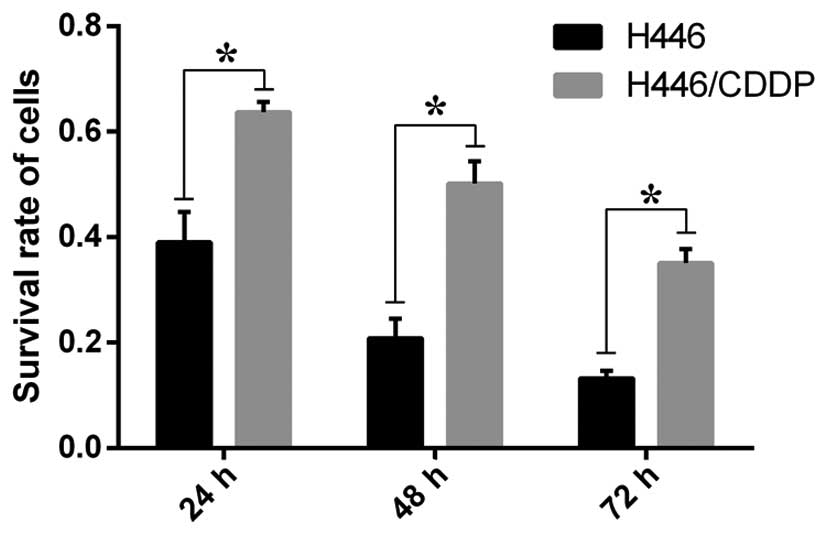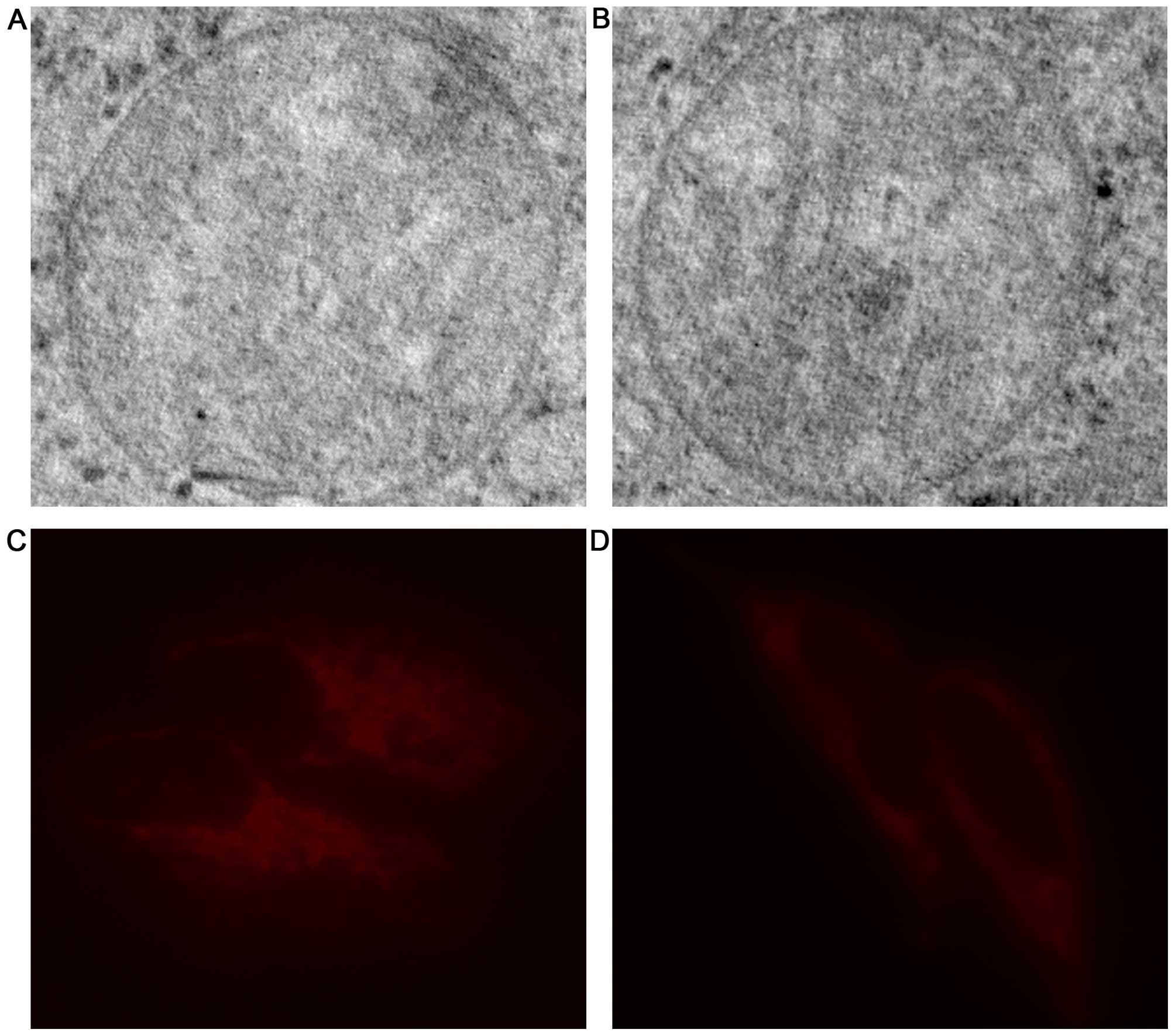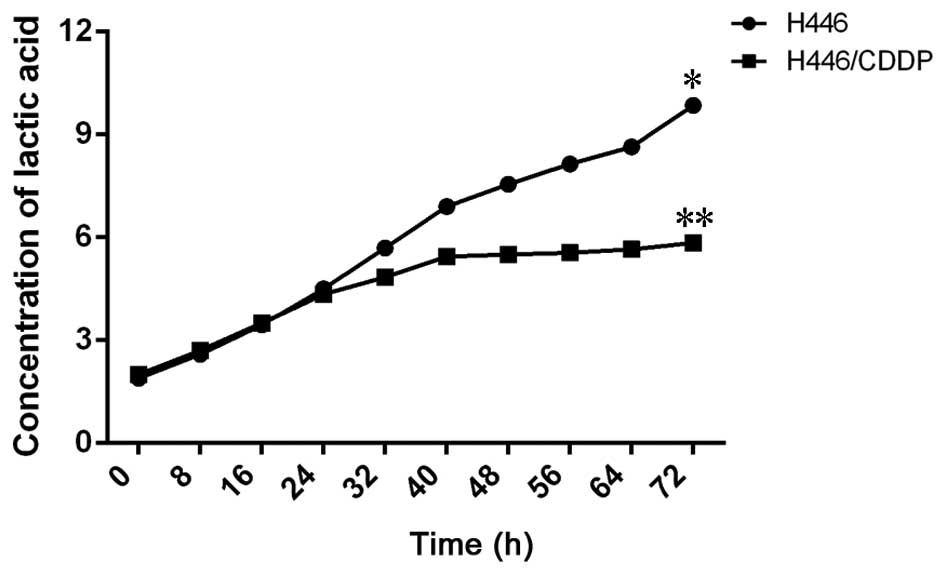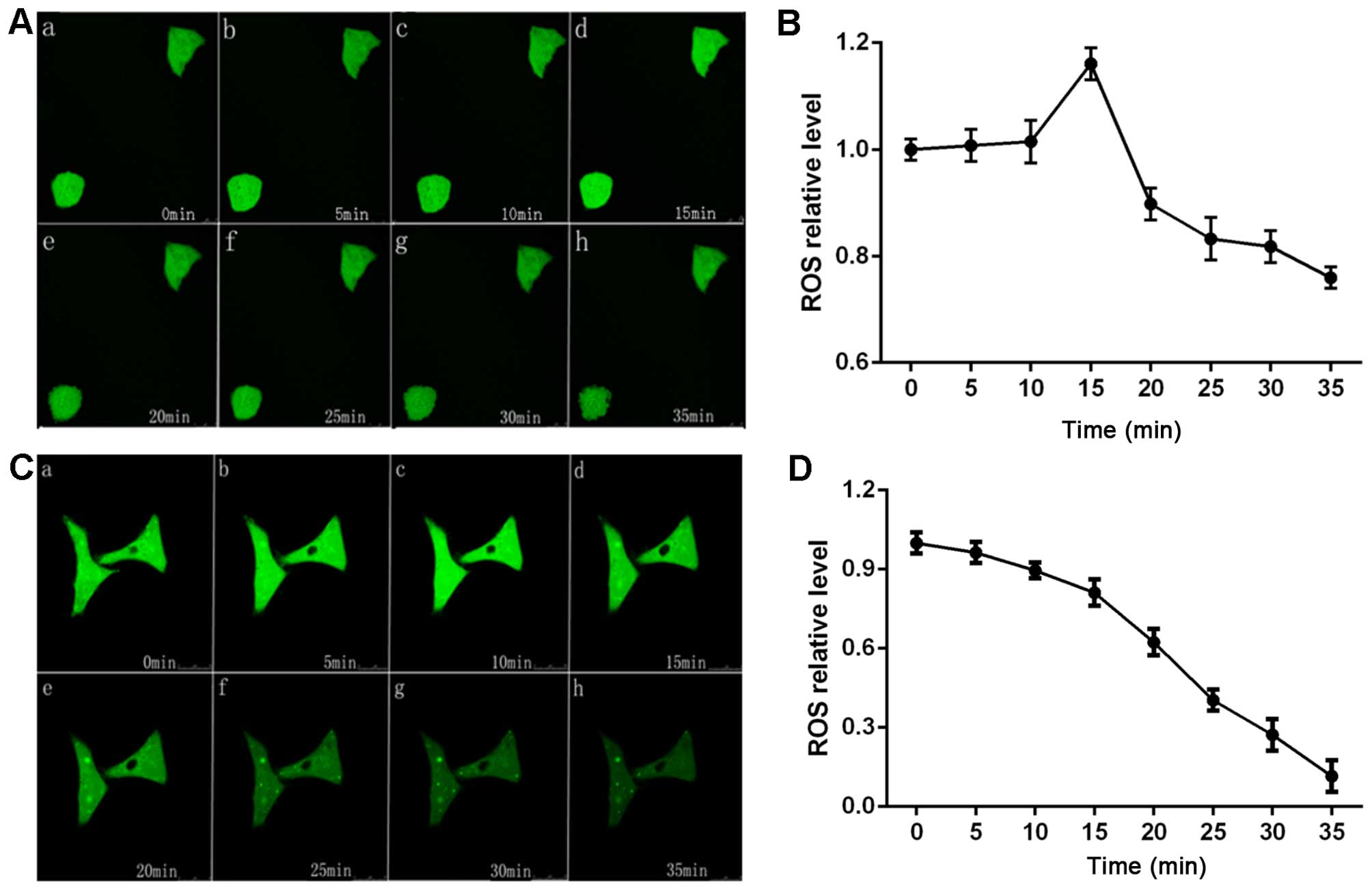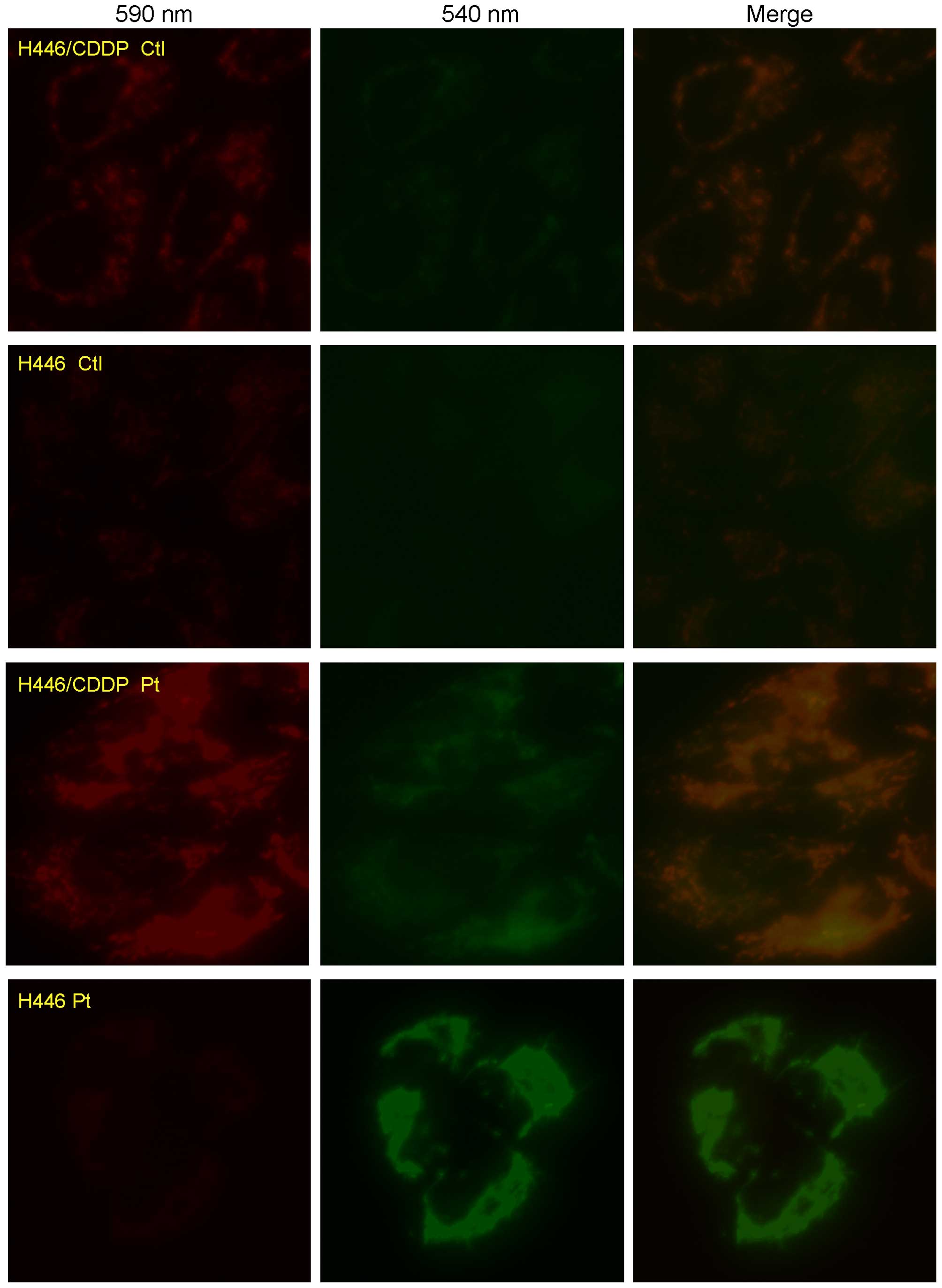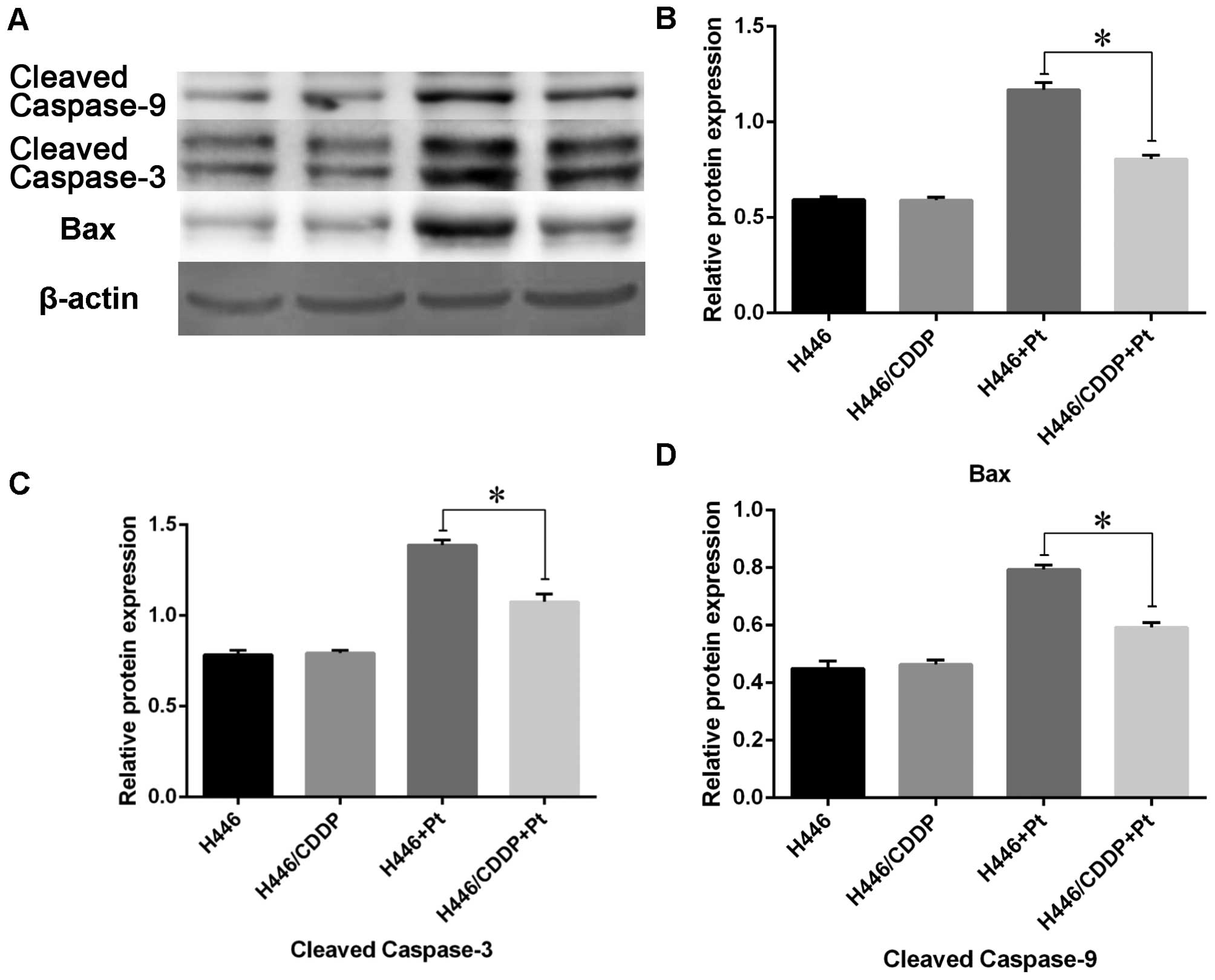|
1
|
Torre LA, Bray F, Siegel RL, Ferlay J,
Lortet-Tieulent J and Jemal A: Global cancer statistics, 2012. CA
Cancer J Clin. 65:87–108. 2015. View Article : Google Scholar : PubMed/NCBI
|
|
2
|
Siegel RL, Miller KD and Jemal A: Cancer
statistics, 2015. CA Cancer J Clin. 65:5–29. 2015. View Article : Google Scholar : PubMed/NCBI
|
|
3
|
Jun S, Dimyan M, Jones KD and Ladabaum U:
Obstipation as a paraneoplastic presentation of small cell lung
cancer: Case report and literature review. Neurogastroenterol
Motil. 17:16–22. 2005. View Article : Google Scholar : PubMed/NCBI
|
|
4
|
Sørensen M, Pijls-Johannesma M and Felip
E; ESMO Guidelines Working Group: Small-cell lung cancer: ESMO
Clinical Practice Guidelines for diagnosis, treatment and
follow-up. Ann Oncol. 21(Suppl 5): v120–v125. 2010. View Article : Google Scholar : PubMed/NCBI
|
|
5
|
Wu X, Zhuang Y and Zhang J: Study on the
molecular mechanism of multi-drug resistance in clinical isolates
of Mycobacterium tuberculosis. Zhonghua Jie He He Hu Xi Za Zhi.
20:332–335. 1997.In Chinese.
|
|
6
|
Murakami S: Molecular mechanism of
multi-drug resistance. Nihon Rinsho. 66:193–203. 2008.In Japanese.
PubMed/NCBI
|
|
7
|
Warburg O, Wind F and Negelein E: The
metabolism of tumors in the body. J Gen Physiol. 8:519–530. 1927.
View Article : Google Scholar : PubMed/NCBI
|
|
8
|
Warburg O: On the origin of cancer cells.
Science. 3191:309–314. 1956. View Article : Google Scholar
|
|
9
|
Upadhyay M, Samal J, Kandpal M, Singh OV
and Vivekanandan P: The Warburg effect: Insights from the past
decade. Pharmacol Ther. 137:318–330. 2013. View Article : Google Scholar
|
|
10
|
Lee HC, Yin PH, Lin JC, Wu CC, Chen CY, Wu
CW, Chi CW, Tam TN and Wei YH: Mitochondrial genome instability and
mtDNA depletion in human cancers. Ann NY Acad Sci. 1042:109–122.
2005. View Article : Google Scholar : PubMed/NCBI
|
|
11
|
Compton S, Kim C, Griner NB, Potluri P,
Scheffler IE, Sen S, Jerry DJ, Schneider S and Yadava N:
Mitochondrial dysfunction impairs tumor suppressor p53
expression/function. J Biol Chem. 286:20297–20312. 2011. View Article : Google Scholar : PubMed/NCBI
|
|
12
|
Chen JZ, Gokden N, Greene GF, Mukunyadzi P
and Kadlubar FF: Extensive somatic mitochondrial mutations in
primary prostate cancer using laser capture microdissection. Cancer
Res. 62:6470–6474. 2002.PubMed/NCBI
|
|
13
|
Heddi A, Faure-Vigny H, Wallace DC and
Stepien G: Coordinate expression of nuclear and mitochondrial genes
involved in energy production in carcinoma and oncocytoma. Biochim
Biophys Acta. 1316:203–209. 1996. View Article : Google Scholar : PubMed/NCBI
|
|
14
|
Gochhait S, Bhatt A, Sharma S, Singh YP,
Gupta P and Bamezai RN: Concomitant presence of mutations in
mitochondrial genome and p53 in cancer development - a study in
north Indian sporadic breast and esophageal cancer patients. Int J
Cancer. 123:2580–2586. 2008. View Article : Google Scholar : PubMed/NCBI
|
|
15
|
Vivekanandan P, Daniel H, Yeh MM and
Torbenson M: Mitochondrial mutations in hepatocellular carcinomas
and fibrolamellar carcinomas. Mod Pathol. 23:790–798. 2010.
View Article : Google Scholar : PubMed/NCBI
|
|
16
|
Larman TC, DePalma SR, Hadjipanayis AG,
Protopopov A, Zhang J, Gabriel SB, Chin L, Seidman CE, Kucherlapati
R and Seidman JG; Cancer Genome Atlas Research Network: Spectrum of
somatic mitochondrial mutations in five cancers. Proc Natl Acad Sci
USA. 109:14087–14091. 2012. View Article : Google Scholar : PubMed/NCBI
|
|
17
|
Guha M, Srinivasan S, Ruthel G, Kashina
AK, Carstens RP, Mendoza A, Khanna C, Van Winkle T and Avadhani NG:
Mitochondrial retrograde signaling induces epithelial-mesenchymal
transition and generates breast cancer stem cells. Oncogene.
33:5238–5250. 2014. View Article : Google Scholar
|
|
18
|
Imanishi H, Hattori K, Wada R, Ishikawa K,
Fukuda S, Takenaga K, Nakada K and Hayashi J: Mitochondrial DNA
mutations regulate metastasis of human breast cancer cells. PLoS
One. 6:e234012011. View Article : Google Scholar : PubMed/NCBI
|
|
19
|
Andrews RM, Kubacka I, Chinnery PF,
Lightowlers RN, Turnbull DM and Howell N: Reanalysis and revision
of the Cambridge reference sequence for human mitochondrial DNA.
Nat Genet. 23:1471999. View
Article : Google Scholar : PubMed/NCBI
|
|
20
|
Ovadje P, Chatterjee S, Griffin C, Tran C,
Hamm C and Pandey S: Selective induction of apoptosis through
activation of caspase-8 in human leukemia cells (Jurkat) by
dandelion root extract. J Ethnopharmacol. 133:86–91. 2011.
View Article : Google Scholar
|
|
21
|
Wallace DC: Mitochondria and cancer. Nat
Rev Cancer. 12:685–698. 2012. View
Article : Google Scholar : PubMed/NCBI
|
|
22
|
Wallace DC: A mitochondrial bioenergetic
etiology of disease. J Clin Invest. 123:1405–1412. 2013. View Article : Google Scholar : PubMed/NCBI
|
|
23
|
Guaragnella N, Giannattasio S and Moro L:
Mitochondrial dysfunction in cancer chemoresistance. Biochem
Pharmacol. 92:62–72. 2014. View Article : Google Scholar : PubMed/NCBI
|
|
24
|
Zhang G, Qu Y, Dang S, Yang Q, Shi B and
Hou P: Variable copy number of mitochondrial DNA (mtDNA) predicts
worse prognosis in advanced gastric cancer patients. Diagn Pathol.
8:1732013. View Article : Google Scholar : PubMed/NCBI
|
|
25
|
Dohi T and Altieri DC: Mitochondrial
dynamics of survivin and 'four dimensional' control of tumor cell
apoptosis. Cell Cycle. 4:21–23. 2005. View Article : Google Scholar
|
|
26
|
Strum SB, Adalsteinsson O, Black RR, Segal
D, Peress NL and Waldenfels J: Case report: Sodium dichloroacetate
(DCA) inhibition of the 'Warburg effect' in a human cancer patient:
Complete response in non-Hodgkin's lymphoma after disease
progression with rituximab-CHOP. J Bioenerg Biomembr. 45:307–315.
2013. View Article : Google Scholar
|
|
27
|
Cui J, Shi M, Xie D, Wei D, Jia Z, Zheng
S, Gao Y, Huang S and Xie K: FOXM1 promotes the Warburg effect and
pancreatic cancer progression via transactivation of LDHA
expression. Clin Cancer Res. 20:2595–2606. 2014. View Article : Google Scholar : PubMed/NCBI
|
|
28
|
Naito A, Carcel-Trullols J, Xie CH, Evans
TT, Mizumachi T and Higuchi M: Induction of acquired resistance to
antiestrogen by reversible mitochondrial DNA depletion in breast
cancer cell line. Int J Cancer. 122:1506–1511. 2008. View Article : Google Scholar
|
|
29
|
Singh KK, Russell J, Sigala B, Zhang Y,
Williams J and Keshav KF: Mitochondrial DNA determines the cellular
response to cancer therapeutic agents. Oncogene. 18:6641–6646.
1999. View Article : Google Scholar : PubMed/NCBI
|
|
30
|
Park SY, Chang I, Kim JY, Kang SW, Park
SH, Singh K and Lee MS: Resistance of mitochondrial DNA-depleted
cells against cell death: Role of mitochondrial superoxide
dismutase. J Biol Chem. 279:7512–7520. 2004. View Article : Google Scholar
|
|
31
|
Hoshida Y, Moriyama M, Otsuka M, Kato N,
Taniguchi H, Shiratori Y, Seki N and Omata M: Gene expressions
associated with chemosensitivity in human hepatoma cells.
Hepatogastroenterology. 54:489–492. 2007.PubMed/NCBI
|
|
32
|
Trachootham D, Alexandre J and Huang P:
Targeting cancer cells by ROS-mediated mechanisms: A radical
therapeutic approach? Nat Rev Drug Discov. 8:579–591. 2009.
View Article : Google Scholar : PubMed/NCBI
|
|
33
|
Degli Esposti M: Mitochondria in
apoptosis: Past, present and future. Biochem Soc Trans. 32:493–495.
2004. View Article : Google Scholar : PubMed/NCBI
|
|
34
|
Salet C, Moreno G, Ricchelli F and
Bernardi P: Singlet oxygen produced by photodynamic action causes
inactivation of the mitochondrial permeability transition pore. J
Biol Chem. 272:21938–21943. 1997. View Article : Google Scholar : PubMed/NCBI
|
|
35
|
Du W, Hong J, Wang YC, Zhang YJ, Wang P,
Su WY, Lin YW, Lu R, Zou WP, Xiong H, et al: Inhibition of
JAK2/STAT3 signalling induces colorectal cancer cell apoptosis via
mitochondrial pathway. J Cell Mol Med. 16:1878–1888. 2012.
View Article : Google Scholar
|















